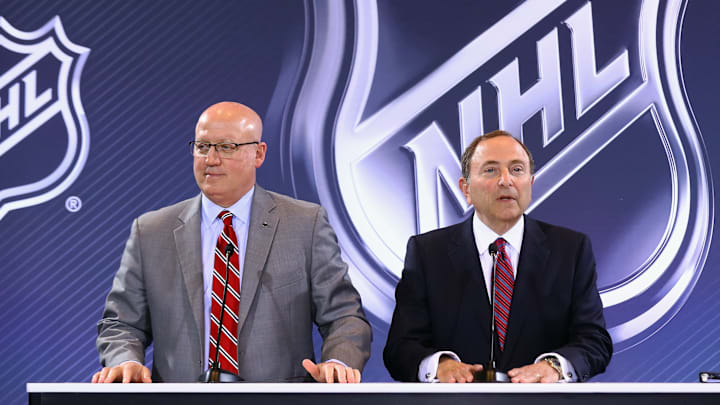There's been plenty to entertain/distract Vancouver Canucks fans of late. The 2024 NHL entry draft, the beginning of free agency and development camp have all come within the last week, leading to a frenzy of activity and news stories.
However, in case people are hoping to try and catch their breath and relax for a moment, there's even more to share with you. It appears that the NHL is aiming to increase the regular season from 82 games to 84 in the near future.
The reported speculations comes from The Athletic's Pierre LeBrun, who is also an NHL insider for TSN. LeBrun took to social media to advise of preliminary discussion between the league and the NHLPA on the next Collective Bargaining Agreement (CBA), including lengthening the regular season.
Other things apparently being discussed include shortening the preseason to four games for all teams, starting the regular season in early October and awarding the Stanley Cup earlier in June. LeBrun said it was effectively an overall case of bringing everything forward by a couple of weeks or so.
Pros and cons of an extended regular season
Increasing the regular season would theoretically be the most contentious issue for the players. If anything they would prefer to have the regular season shortened, given the negative aspect of how much physical punishment they undertake. (There have actually been calls from some, to shorten the regular season down to 70 games.)
However, the harsh reality is that the bottom line for the NHL and the team owners is money, which will only go up with two more regular season games. Of course they will try to make it sound like they do care, with the plan to shorten the preseason, even though the top players don't participate as much in these games anyway, combined with the intensity being dialled down considerably.
Purely from an alignment perspective, increasing to 84 regular season games does make things easier in respect of working out the schedules every year. Using the Canucks as an example, they would play four games versus the rest of the Pacific Division, three versus the Central Division, and two versus every team in the Eastern Conference.
An earlier cup award is a positive
We do like the idea of bringing up the beginning of the regular season and by extension having the Stanley Cup awarded earlier in June. For example having it presented this season to the Florida Panthers on June 24, was just too late.
(Just to be clear by the way, we're not complaining about how long the Stanley Cup Final actually lasted. Having two off days between games for the majority of the series definitely helped with the quality of the performances, with players having more time to rest and recover.)
It will be interesting to find out how these talking points impact negotiation of a new CBA, with the old one set to expire on Sept. 15 in 2026. There are already concerns that NHL commissioner Gary Bettman will have no problem enforcing another lockout if need be. (Consider that there have recently been examples of new player contracts including bonuses for every year of their deal, with the exception of the 2026-27 season.)
This is certainly something hockey fans would prefer to be avoided. The previous lockouts in 1994-95, 2004-05 and 2012-13 undoubtedly impacted the reputation and popularity of the NHL, especially in comparison to the NFL, MLB and NBA.
NB - Ian Cole was the Canucks' representative this past season for the NHLPA. With him now moving on to Utah, we would assume alternate rep Tyler Myers will take over as the main one.
